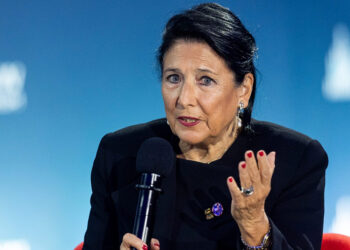The Documentary Association Georgia has partnered with KineDok Georgia to launch a new thematic program called Belarus 2020. Last month, as part of the growing DOCA Film Club, these two institutions jointly developed and implemented a special program titled ‘What Happened in Russia?’ This program aimed to highlight the reasons behind and, more importantly, the consequences of the adoption of the foreign agents law.
[Editor’s Note: The newspaper version of this story wrote “CineDoc” – it was an editorial mistake and we apologize to both organizations – CineDoc and KineDok – as well as to our readers, for the confusion].
Following the protests and their suppression in Tbilisi, these two major associations of Georgian documentary filmmakers and enthusiasts turned their focus to analyzing the protests in Belarus. Initially, it seemed possible to resist authoritarianism peacefully in Belarus, but these efforts were only brief flashes before leading to isolation and more severe repression. The next screening will feature ‘Motherland,’ directed by Alexander Mihalkovich and Hanna Badziaka. Each DOCA Film Club screening includes subtitles in both Georgian and English. The first film in this series was ‘Courage,’ directed by Aliaksei Papuyan.
Paluyan’s ‘Courage’ is a poignant documentary that delves into the heart of Belarus’s struggle for democracy, providing a visceral glimpse into the lives of those who stand up to oppression. Through the lens of three actors from the Belarus Free Theatre in Minsk, the film captures the raw emotions, personal sacrifices, and indomitable spirit of a people yearning for freedom.
Themes of Resistance and Identity
At its core, ‘Courage’ is a narrative of resistance. The title itself encapsulates the essence of the documentary, emphasizing the bravery required to oppose an authoritarian regime. The three protagonists, Maryna Yurevich, Pavel Garadnitski, and Denis Tarasenko, are not just actors; they are symbols of the broader Belarusian resistance. Their involvement in the protests against President Alexander Lukashenko’s regime transcends mere political activism: It becomes a quest for identity and self-expression in a country that stifles dissent.
The film explores how art and politics intertwine, with the Belarus Free Theatre serving as a microcosm of the larger societal struggle. The theater, known for its underground and often controversial performances, represents a bastion of free thought and creative resistance. Through their art, the protagonists challenge the status quo, using performance as a form of protest and a means of reclaiming their identity in a repressive environment.
Cinematic Techniques and Narrative Structure
Paluyan employs a cinéma vérité style, which enhances the authenticity and immediacy of the documentary. This approach allows viewers to experience the events as they unfold, creating a sense of immersion and emotional engagement. The handheld camera work, often shaky and intimate, mirrors the instability and chaos of the protests, effectively conveying the tension and danger faced by the participants.
The narrative structure of ‘Courage’ is both linear and episodic, weaving together personal stories with broader political events. This dual focus ensures that the documentary is not merely a political statement but also a deeply human story. By interspersing scenes of the actors’ everyday lives with footage of the protests, Paluyan highlights the personal stakes involved in the struggle for freedom. This juxtaposition also underscores the pervasive impact of the political situation on all aspects of life in Belarus.
Sociopolitical Context and Impact
The backdrop of ‘Courage’ is the 2020 Belarusian presidential election, widely regarded as fraudulent, which sparked massive protests across the country. The documentary provides crucial context for understanding the scale and significance of these events. It chronicles the brutal crackdown on protesters, the widespread detentions, and the pervasive atmosphere of fear and repression.
However, ‘Courage’ is not just a chronicle of victimhood; it is a testament to resilience and solidarity. The film captures moments of collective action and mutual support among the protesters, illustrating the strength of community in the face of tyranny. This aspect of the documentary is particularly resonant, as it portrays the Belarusian struggle as part of a larger, universal fight for human rights and democracy.
The impact of ‘Courage’ extends beyond its immediate subject matter. By bringing international attention to the situation in Belarus, the film serves as a call to action for the global community. It underscores the importance of solidarity and the need for international support in the fight against dictatorship.
In an era marked by the resurgence of authoritarianism worldwide, the film ‘Courage’ emerges as a poignant reminder of the human spirit’s resilience and the enduring importance of standing up for one’s beliefs. It underscores the idea that, despite the inherent risks, the pursuit of freedom and democracy remains a noble and necessary endeavor.
By Ivan Nechaev














